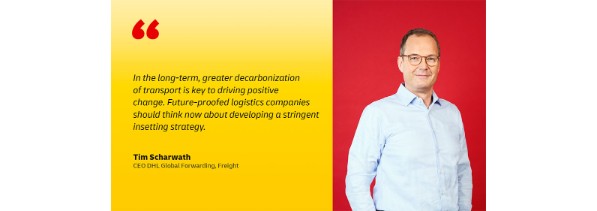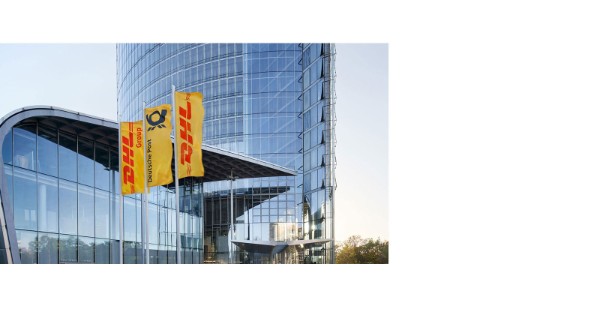Deutsche Post DHL Group and the Smart Freight Centre call for carbon insetting to accelerate decarbonization of global freight transportation
By unlocking this vital resource, a significant lever would be created to support the technological shift towards greener logistics.
- White paper sees carbon insetting as important lever to accelerate decarbonization of the transport sector
- Effective action requires comprehensive collaboration between carriers, forwarders and shippers
- Development and acknowledgement of international accounting methods and guidelines are a prerequisite for successful implementation of insetting in logistics
Bonn - Deutsche Post DHL Group together with Smart Freight Centre, a non-profit organization dedicated to sustainable freight, is advocating a new pathway to freight decarbonization - carbon insetting. A jointly developed white paper, "Carbon Insets for the Logistics Sector", recommends an innovative approach for allocating funds to decarbonization projects in the logistics industry. By unlocking this vital resource, a significant lever would be created to support the technological shift towards greener logistics. Ample solutions already exist, such as sustainable fuel, fleet renewal, engine retrofitting, and efficiency projects. These investments would not only be a highly efficient way to decarbonize the transport sector, but also result in structural improvements of the entire logistics supply chain in the long run. The complete white paper "Carbon Insets for the Logistics Sector" is now available for free download here and at https://cutt.ly/SFC-carbon-insets.
"To ensure that the logistics industry can continue to contribute successfully to the fight against climate change, we need a uniform and sector-specific standard for compensating for, and reducing, carbon emissions," says Tim Scharwath, Member of the Board of Management of Deutsche Post DHL Group, CEO DHL Global Forwarding, Freight. "In the long-term, greater decarbonization of transport is key to driving positive change. Future-proofed logistics companies should think now about developing a stringent insetting strategy."
"There is an opportunity to channel carbon offset funds related to transportation emissions to projects within the logistics sector - a practice known as carbon insetting," says Suzanne Greene, Smart Freight Centre's Expert Advisor and author of the white paper. "This paper lays the foundation for a system to accelerate freight decarbonization." The concept of carbon insetting for the freight sector was developed through her work with the Massachusetts Institute of Technology's Sustainable Supply Chains initiative.

Setting the scene: carbon emissions in the logistics sector
Freight transportation is currently responsible for 8% of global carbon emissions (11% if emissions from logistics sites are included). Recent studies by the International Transport Forum forecast these emissions to double by 2050 as demand is anticipated to grow threefold in this period. Climate action by companies is largely voluntary and lacks coordination and thus the pace of freight decarbonization is too slow. Some freight operators mitigate part of their transportation emissions by investing in carbon offsets, such as in forestry projects. In 2018, only 0.2% of the USD 268 million voluntary carbon offset market went into transport-related projects. Funds spent outside the transport sector are meaningful but will not help to advance the decarbonization of the global freight transportation network itself.
Proposed solution: Carbon Insetting
Carbon insetting, where offset funding is directed to address impacts inside the logistics supply chain, can be part of the solution to accelerate decarbonization of the transport sector.
The types of projects that could be applied at scale are numerous: the scaling of alternative, sustainable fuels, fleet renewal or engine retrofits can upgrade transportation networks with lower carbon technologies. Improving the efficiency of shipments leads to reduced fuel consumption and avoids excess emissions. All these approaches provide meaningful reductions in climate impact, as well as benefits for public health and safety and therefore do not only contribute to achieving the Paris Agreement, but also support the Sustainable Development Goals.
Putting the concept into practice: Lighthouse projects already ongoing
The white paper highlights specific examples that provide a blueprint for insets. For sustainable aviation fuels (SAF), an insetting solution with a book and claim mechanism for sustainable fuel certificates would remove barriers, such as the need for physical traceability of those fuels in a company's supply chain, while providing the funding to incentivize further development of these fuels. This concept is similar to the GoodShipping program, which is advancing the use of biofuels in ocean freight. In addition, Deutsche Post DHL Group's insetting program to foster sustainable road freight technologies, the Skicka Grönt ("Send Green") program in Sweden is featured: customers participating in the program pay a fixed surcharge for every shipped parcel, which is then fully invested into biofuels and electric vehicles within for the Swedish transport network.
Call for action: Collaboration across the industry needed
While there is vast potential to apply carbon insets to the transportation sector, there is a need for an industry-wide initiative to further develop, advance and standardize the concept. MIT Sustainable Supply Chains, Smart Freight Centre and its Global Logistics Emissions Council (GLEC), which Deutsche Post DHL Group is a member of, want to move the needle on this issue. The first step is to develop methods and guidelines for carbon inset accounting and reporting, based on the GLEC Framework, that covers logistics emissions more broadly, and test this with companies. This is the first prerequisite for taking further steps to fully enable acceptance of carbon insetting as a viable means to reduce outsourced "scope 3" freight transport emissions in the logistics industry. The next step is for these mechanisms to be acknowledged by existing and future reporting and accounting standards. Carriers, forwarders and shippers need to work together to achieve this goal.

Corporate Press Office
Journalists can contact the Corporate Press Office at DHL Group's headquarters here.
- DHL Group
Charles-de-Gaulle-Str. 20
53113 Bonn
Germany - Phone: +49 (0)228 182 9944
- X (twitter): @DHLglobal